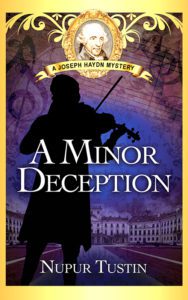 Touched by the Bard – Shakespeare’s Influence on the Haydn Mysteries by Nupur Tustin
Touched by the Bard – Shakespeare’s Influence on the Haydn Mysteries by Nupur Tustin
It was from the Cambridge Companion to Haydn that I learned that the great composer’s library contained the complete volume of Shakespeare’s plays—in the original English at that. Shakespeare’s plays were quite popular in the German-speaking world.
They were enacted in the Esterházy theater, and Haydn would have had to compose incidental music for these performances. They were even popular, Tim Blanning tells us in his biography of Frederick the Great, in Prussia. The king himself denigrated his subjects’ taste in the matter; nevertheless, the plays were widely appreciated by audiences.
That Haydn appreciated them as well pleased me no end. I enjoy Shakespeare. I especially like his comedies, but I’ve immersed myself in the tragedies as well. Naturally, I wondered how to incorporate something of the great bard into my Haydn Mysteries.
Comic writers from Shakespeare and Ben Jonson to Oscar Wilde and G.B. Shaw have used certain stock ideas to elicit laughter: the appearance and disappearance of an item; mistaken identity; characters acting at cross-purposes.
So, in A Minor Deception, the missing violinist Bartó’s travel trunk disappears, reappears, only to disappear all over again. The maids Rosalie and Greta discover it, and their consternation when it vanishes barely an hour later is fairly comic. To make matters worse, only Rosalie has seen it.
Greta, of course, stands staunchly by her friend, although there’s a suggestion Rosalie might be mistaken. As in a Shakespearean play, the reader is Rosalie’s only witness. And theories abound as to the cause of the trunk’s disappearance and the parties responsible for it.
In another scene, Rosalie and Greta bring down, at Haydn’s behest, the musicians’ violin case on the pretext that the Prince has ordered every case be polished in preparation for the upcoming imperial visit.
The maid, however, are actually looking for the emblem of Matthias Corvinus, a bygone Hungarian king said to inspire the Hungarian dissidents’ anti-Habsburg efforts. The musician who sports the emblem will likely be the traitor whom the missing violinist Bartó has maneuvered into the palace.
But in their haste to examine the violin cases, they quite forget the polish and rags that will lend credence to their pretext. And, yes, they are discovered by a key suspect.
It’s the kind of thing you might see on Frasier, a brilliant television comedy featuring a goofy but lovable psychiatrist, Frasier Crane, and his brother, Niles. While obstacles lend comic effect in a comedy, in a mystery, they help to delay the resolution of the mystery, making the solution that much harder to achieve.
In my short story, The Baker’s Boy, Haydn’s involvement in the mystery plot is inspired by an idea from Shakespeare’s Macbeth. Like Macbeth, Haydn receives a prophecy: his fortunes will turn. And like Macbeth, Haydn isn’t content with leaving the matter to the fates. He can’t help feeling that he needs to intervene to prove the baker’s boy innocent of the baker’s murder.
The scrap of the Lord’s Shroud they’ve both purchased may not have sufficient power to protect them. But if Haydn can prove the boy innocent, then maybe he can allow himself to believe that the piece of shroud will reverse his own ill fortune.
In Aria to Death, the second Haydn mystery, the plot of The Merchant of Venice provides Haydn with an important clue to the location of the lost operas of Monteverdi that constitute his friend Kaspar’s bequest and for which Kaspar was murdered.
Kaspar’s uncle’s will contains references to Shakespeare’s play and the bequest itself is hidden behind a fake volume of the play in his library.
Portia’s father in Shakespeare’s play leaves behind a test of character for the young men courting his daughter. Kaspar’s uncle does the same for the many men seeking the Monteverdi operas he’s procured. He’s quite sure Kaspar has the strength of character required to earn his bequest. Unfortunately, Kaspar is murdered before he can find it and the solution to this puzzle is left to Haydn.
Needless to say, Haydn does work it out. All thanks to his knowledge of Shakespeare’s works.
~ ~ ~ ~ ~ ~ ~
A mystery writer and composer, Nupur Tustin is the author of A Minor Deception, the first in the Joseph Haydn Mystery Series. Aria to Death, the second in the series, will be released later this year. Her short stories have been published in Mystery Weekly and Heater magazines and are available on Amazon. A Haydn story, The Baker’s Boy, is included in the anthology, Day of the Dark.
Haydn Series: http://ntustin.com
Sample Haydn’s Sleuthing Skills in “Whiff of Murder”: http://ntustin.com/tasteofmurder
Facebook: https://www.facebook.com/ntustinauthor/
Goodreads: http://www.goodreads.com/author/show/8616151.Nupur_Tustin
Amazon: http://mybook.to/MinorDeception
Kobo: https://store.kobobooks.com/en-us/ebook/a-minor-deception
iTunes: https://itunes.apple.com/us/book/id1164641370
Barnes & Noble: https://www.barnesandnoble.com/w/a-minor-deception-nupur-tustin/1124827923
Thanks so much for hosting me, Debra!
My pleasure. A truly interesting topic.
I read and thoroughly enjoyed A Minor Deception, but somehow missed the classic comedy device that Shakespeare used so often and so well. Guess I was too caught up in the story to analyze.Good job. It’s interesting to think of a connection between these two creative geniuses.
Sandra,
Thanks for stopping by. I think the story/book are so well written that the use of the classic comedy device can slip by when one gets caught up in the tale, but it effectively lays a framework or grounding for interpretation.
I’m so glad you enjoyed the story, Sandy! Thank you so much for stopping by.